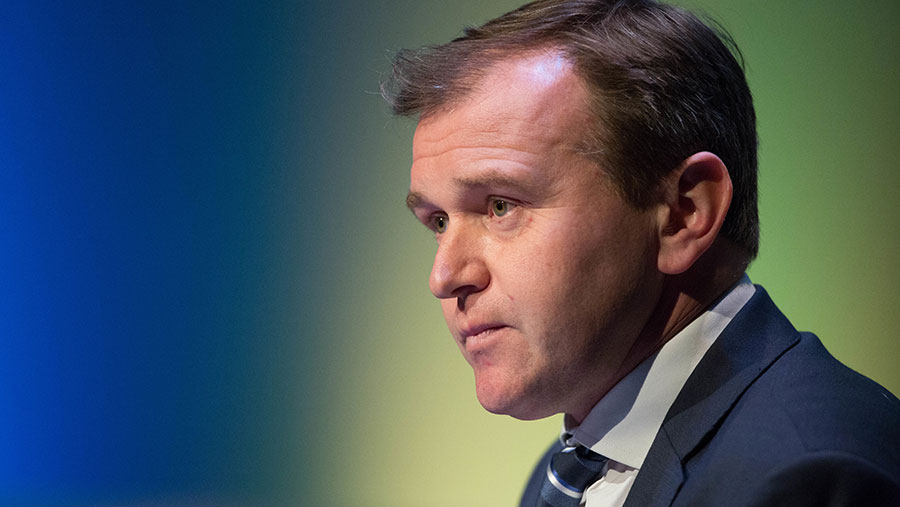George Eustice faces farmer backlash over trade deal comments
 © Tim Scrivener
© Tim Scrivener Former Defra secretary George Eustice is facing a backlash from farmers over comments he made in the House of Commons this week in a debate on the Australia and New Zealand free-trade deals.
Speaking on Monday evening (14 November), Mr Eustice described the deals as “not very good” and attacked former trade secretary (and prime minister) Liz Truss for her poor negotiating tactics.
See also: Australian trade deal – opportunities and threats to UK farmers
“Since I now enjoy the freedom of the back benches, I no longer have to put such a positive gloss on what was agreed,” he said.
“The first step is to recognise that the Australia trade deal is not actually a very good deal for the UK, which was not for lack of trying on my part.”
Mr Eustice alluded to “deep arguments and difference in Cabinet” and said the top civil servant in charge of negotiations, Crawford Falconer, was “not fit for that position”.
Giveaway
“Overall, the truth of the matter is that the UK gave away far too much for far too little in return,” said Mr Eustice.
“We did not actually need to give Australia nor New Zealand full liberalisation of beef and sheep. It was not in our economic interest to do so. And neither Australia not New Zealand had anything to offer in return for such a grand concession.”
While the UK had entered negotiations “holding the best cards”, Mr Eustice said Ms Truss’ sudden determination to secure a trade deal ahead of the G7 meeting of world leaders (in Cornwall in June 2021) had put the UK “on the back foot”.
Under the deals struck with Australia and New Zealand, the two country’s exporters are to be given improved access to the UK market for agricultural commodities such as beef, sheep and dairy produce.
Under the Australia deal, for example, tariff-free quotas will increase each year until imports can come in duty free after 10 years (five years for dairy).
Undermined
Farming organisations warn that this has the potential to greatly undermine UK producers, who do not enjoy the same economies of scale as producers in Australia and New Zealand, yet have to achieve higher environmental and welfare standards, adding to costs.
Farmers’ Union of Wales president Glyn Roberts said Mr Eustice had confirmed everything farm leaders were warning of throughout, and that the positive spin given by politicians at the time were “complete nonsense”.
“The UK gave away massive and, ultimately, complete access to our markets for beef, lamb and dairy products in exchange for minute benefits, all in order to meet deadlines for politically expedient press releases,” he said.
The deals were recognised around the globe as being “incredibly weak” and had made the UK “a laughing stock” on the international stage.
Commenting on social media, Farmers Weekly columnist Joe Stanley said he understood the need for collective Cabinet responsibility, but he was dismayed that Mr Eustice had “defended this to the hilt when he was minister”. “What is a resigning matter in 2022?” he asked.
I understand collective cabinet responsibility; but GE defended this to the hilt whilst minister.
At what point *should* personal conscience/the national interest kick in & trump personal considerations of advancement/ministerial position? What is a resigning matter in 2022?
— Joe Stanley 🇺🇦 (@JoeWStanley) November 14, 2022
Stephen Parkinson (@onceafarmer) also suggested Mr Eustice should have “stood down on principle”, adding that the trade deal was “purely for Truss to claim she had achieved something in order to push her credibility with the Brexit wing”.
This says everything about Eustice. If he had any morals he would have said this publicly at the time and stood down on principle. This was a trade deal purely for Truss to claim she had achieved something in order to push her credibility with the Brexit wing. Utterly scandalous. https://t.co/hA3cQ7rGSr
— Stephen Parkinson (@OnceAFarmer) November 14, 2022
Defense
Defending the government’s free-trade deal with Australia, a Department for International Trade spokesperson pointed to the £10.4bn of additional bilateral trade the deal would stimulate, “supporting economic growth in every part of the UK”.
“We have always said that we will not compromise the UK’s high environmental, animal welfare or food safety standards and the deal includes a range of safeguards to support British farmers,” the spokesperson added.
“The independent Trade and Agriculture Commission also recently concluded that the deal upholds the UK’s robust domestic protections.”
Speaking in the debate in the House of Commons, junior trade minister Andrew Bowie also defended the civil servants cited by Mr Eustice, insisting they were working “day and night” to advance the country’s best interests.
He pointed out that Australian and New Zealand exporters are more focused on “booming” markets in Asia and the Pacific. They had consistently failed to fill existing quotas for sheepmeat to the UK, he added.
